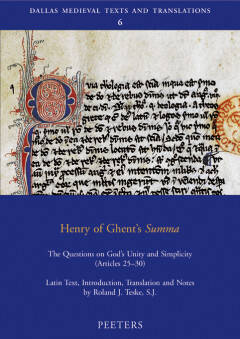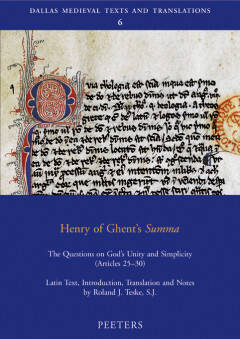
Bedankt voor het vertrouwen het afgelopen jaar! Om jou te bedanken bieden we GRATIS verzending (in België) aan op alles gedurende de hele maand januari.
- Afhalen na 1 uur in een winkel met voorraad
- In januari gratis thuislevering in België
- Ruim aanbod met 7 miljoen producten
Bedankt voor het vertrouwen het afgelopen jaar! Om jou te bedanken bieden we GRATIS verzending (in België) aan op alles gedurende de hele maand januari.
- Afhalen na 1 uur in een winkel met voorraad
- In januari gratis thuislevering in België
- Ruim aanbod met 7 miljoen producten
Zoeken
€ 91,95
+ 183 punten
Omschrijving
This volume continues Professor Roland Teske's translation of a series of important questions from Henry of Ghent's Summa of Ordinary Questions (Summa quaestionum ordinarium). It contains the Latin text of questions 25 through 30 (which treat of God's unity and simplicity), a close English translation, a philosophical introduction, and notes identifying all of Henry's sources. Moreover, there is a glossary of Henry's often complex technical terminology. The questions translated in this volume impressively reflect the changed intellectual climate in the last quarter of the thirteenth century, after the condemnations of 1277. To Henry, Aristotelianism is not a viable option for a Christian thinker. Reading the Philosopher "with greater historical accuracy than Thomas Aquinas," as Teske writes, Henry reaffirms the Catholic faith vigorously against the influence of a philosophy that, in his view, applies principles of Greek metaphysics to Christianity without sufficient discernment. Henry develops many of his positions in critical dialogue with Thomas Aquinas, whom he associates with the overly enthusiastic kind of Aristotelianism that he helped condemn in 1277.
Specificaties
Betrokkenen
- Auteur(s):
- Uitgeverij:
Inhoud
- Aantal bladzijden:
- 388
- Taal:
- Engels
- Reeks:
- Reeksnummer:
- nr. 6
Eigenschappen
- Productcode (EAN):
- 9789042918115
- Verschijningsdatum:
- 18/09/2006
- Uitvoering:
- Paperback
- Formaat:
- Trade paperback (VS)
- Afmetingen:
- 172 mm x 243 mm
- Gewicht:
- 975 g

Alleen bij Standaard Boekhandel
+ 183 punten op je klantenkaart van Standaard Boekhandel
Beoordelingen
We publiceren alleen reviews die voldoen aan de voorwaarden voor reviews. Bekijk onze voorwaarden voor reviews.









